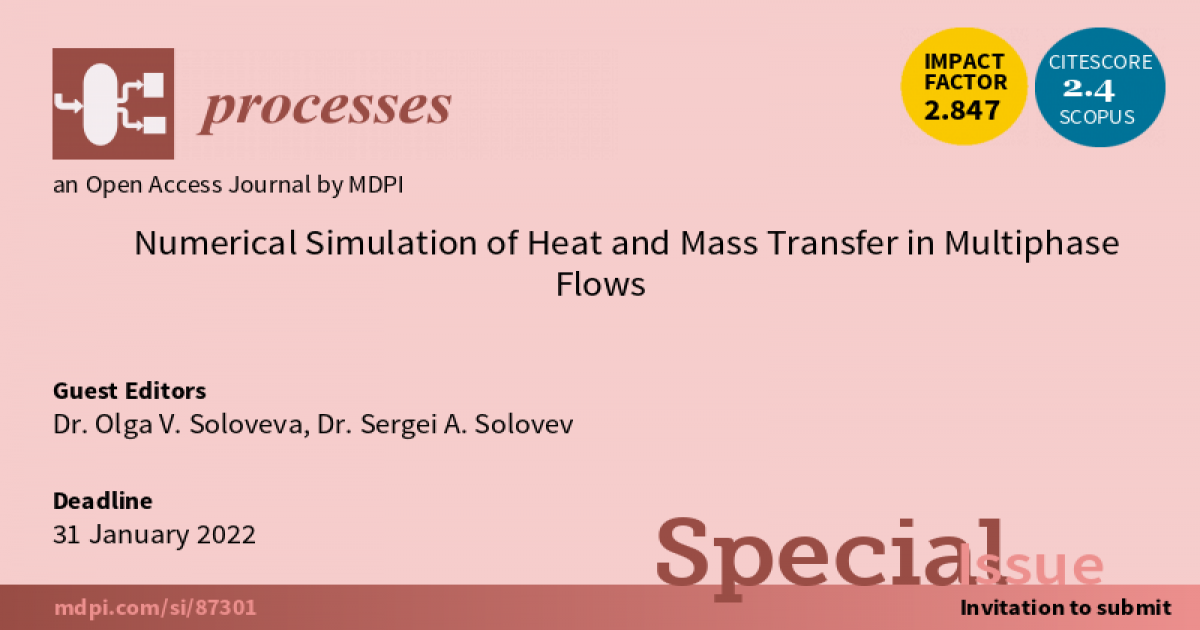Numerical Simulation of Heat and Mass Transfer in Multiphase Flows
A special issue of Processes (ISSN 2227-9717). This special issue belongs to the section "Chemical Processes and Systems".
Deadline for manuscript submissions: closed (10 October 2023) | Viewed by 3864

Special Issue Editors
Interests: heat and mass transfer; numerical simulation; porous media; granular filter; aerosol particles; CFD; hydrodynamics
Special Issue Information
Dear Colleagues,
The phenomenon of heat and mass transfer in multiphase flows is found in many technical applications. For example, fouling of metal heat exchangers significantly reduces heat transfer and is a particular problem to be studied. Many technological processes in petrochemicals and refineries (e.g., heterogeneous catalysis) proceed with heat and mass transfer when flows interact in different phase states. In industrial power engineering, heating/cooling problems are also relevant in the interaction of phases in different states (e.g., gas–liquid). With the development of numerical methods and increasing computational resources, research at the mesoscale to modify and control model parameters and capture individual micro vortices has become a relevant research topic in heat transfer. Numerical simulations are designed to complement experimental studies and predict flow behaviour with different variations.
This issue focuses on presenting worldwide numerical and experimental studies of heat exchange processes in multiphase flows of various technical and natural systems. Such interdisciplinary work, combining the fundamentals of heat transfer, multiphase mechanics, and numerical methods, is at the peak of modern scientific research and can significantly contribute to the development of new technologies and optimization of technological processes. Experts in the field of heat transfer in multiphase flows are invited to submit review articles, short notes, ongoing research papers to the Special Issue of Processes—"Numerical Simulation of Heat and Mass Transfer in Multiphase Flows".
Dr. Olga Soloveva
Dr. Sergei Solovev
Guest Editors
Manuscript Submission Information
Manuscripts should be submitted online at www.mdpi.com by registering and logging in to this website. Once you are registered, click here to go to the submission form. Manuscripts can be submitted until the deadline. All submissions that pass pre-check are peer-reviewed. Accepted papers will be published continuously in the journal (as soon as accepted) and will be listed together on the special issue website. Research articles, review articles as well as short communications are invited. For planned papers, a title and short abstract (about 100 words) can be sent to the Editorial Office for announcement on this website.
Submitted manuscripts should not have been published previously, nor be under consideration for publication elsewhere (except conference proceedings papers). All manuscripts are thoroughly refereed through a single-blind peer-review process. A guide for authors and other relevant information for submission of manuscripts is available on the Instructions for Authors page. Processes is an international peer-reviewed open access monthly journal published by MDPI.
Please visit the Instructions for Authors page before submitting a manuscript. The Article Processing Charge (APC) for publication in this open access journal is 2400 CHF (Swiss Francs). Submitted papers should be well formatted and use good English. Authors may use MDPI's English editing service prior to publication or during author revisions.
Keywords
- modelling and simulation
- numerical methods
- computational fluid dynamics (CFD)
- heat transfer in multiphase flow
- mass transfer in multiphase flow
- heat exchangers
- process optimization
Benefits of Publishing in a Special Issue
- Ease of navigation: Grouping papers by topic helps scholars navigate broad scope journals more efficiently.
- Greater discoverability: Special Issues support the reach and impact of scientific research. Articles in Special Issues are more discoverable and cited more frequently.
- Expansion of research network: Special Issues facilitate connections among authors, fostering scientific collaborations.
- External promotion: Articles in Special Issues are often promoted through the journal's social media, increasing their visibility.
- e-Book format: Special Issues with more than 10 articles can be published as dedicated e-books, ensuring wide and rapid dissemination.
Further information on MDPI's Special Issue polices can be found here.






